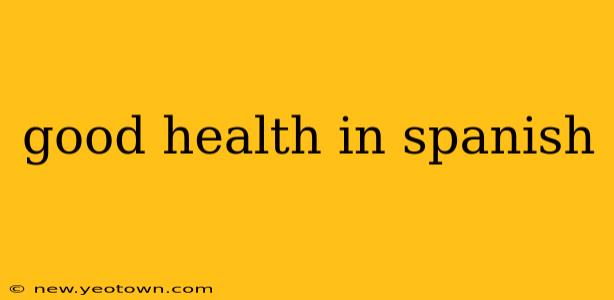The simple phrase "good health" translates readily into Spanish as buena salud. But the concept itself, like the experience of well-being, is far richer and more nuanced than a simple translation can convey. This exploration delves into the various ways "buena salud" is understood and expressed in the Spanish-speaking world, considering not only physical well-being but also the crucial aspects of mental and emotional health.
Let's embark on a journey to discover the multifaceted nature of buena salud and the cultural perspectives that shape its understanding.
What does "buena salud" encompass?
Buena salud in Spanish, much like its English equivalent, goes beyond the mere absence of disease. It encompasses a holistic view of well-being, encompassing physical, mental, and emotional health. This includes:
-
Physical health (salud física): This is the most straightforward aspect, referring to the absence of illness, proper functioning of the body's systems, and maintaining a healthy weight through balanced nutrition and regular exercise. Think of vibrant energy, strong immunity, and the ability to perform daily tasks without discomfort.
-
Mental health (salud mental): Crucially, buena salud also encompasses a positive mental state. This involves emotional resilience, the ability to manage stress effectively, and a positive outlook on life. It's about having a clear mind, feeling emotionally stable, and being able to cope with life's challenges.
-
Emotional health (salud emocional): Closely related to mental health, emotional well-being focuses on the ability to understand and manage one's feelings. It includes self-awareness, self-acceptance, and the capacity for healthy relationships. This is about emotional intelligence and the ability to navigate the complexities of human interaction.
How do Spanish speakers express "good health"?
While buena salud is the most common and direct translation, there are other ways to express the concept of good health in Spanish, depending on the context and nuance you want to convey:
-
Estar sano/a: This means "to be healthy" and is a common way to describe someone in good physical health.
-
Tener buena salud: Similar to "to have good health," this emphasizes the possession of good health.
-
Gozar de buena salud: This more elegant phrase translates to "to enjoy good health" and suggests a more active and appreciative state of well-being.
What are some common phrases related to health in Spanish?
Beyond the direct translation of "good health," many idioms and phrases reflect the cultural understanding of well-being. These expressions often incorporate metaphors related to nature, vitality, and strength.
How is "buena salud" prioritized in different Spanish-speaking cultures?
The emphasis on specific aspects of buena salud can vary across different Spanish-speaking cultures. While the importance of physical health is universally recognized, the social and cultural contexts might influence the understanding and prioritization of mental and emotional well-being. Family support systems, community connections, and traditional healing practices can significantly shape the individual's approach to health and wellness.
What are some cultural perspectives on health in Spanish-speaking countries?
The concept of buena salud is deeply intertwined with cultural beliefs and practices in many Spanish-speaking countries. Traditional medicine, family support systems, and spiritual beliefs often play an important role in promoting well-being.
This journey into the world of buena salud highlights the multifaceted nature of good health and the richness of its expression in the Spanish language. It's more than just the absence of disease; it's a holistic state of well-being that encompasses physical, mental, and emotional health, shaped by individual experiences and cultural contexts. Understanding these nuances allows for a deeper appreciation of the value placed on buena salud within Spanish-speaking communities.

